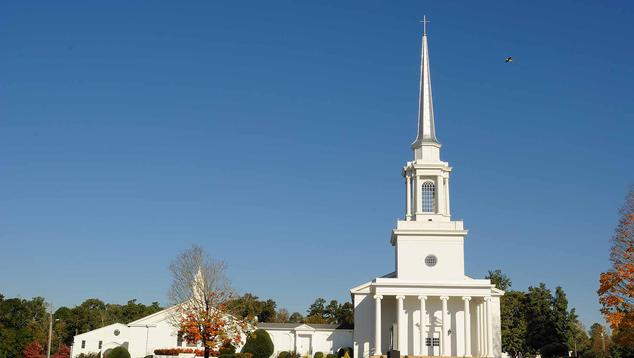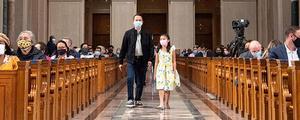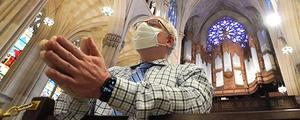The annual Southern Baptist convention begins Sunday in Nashville, an event predicted to bring together over 12,000 messengers from churches all over the nation to pray, vote on leadership, and debate theology and policies.
This is a significant event, given that the Southern Baptist denomination remains the largest Protestant group in the U.S. and the second-largest religious group in America, behind only Roman Catholics. The denomination -- a fairly loose confederation of autonomous congregations without a strict or official hierarchy -- includes an estimated 47,000 churches in the U.S.
Who Are the Southern Baptists?
The Southern Baptists came into being in 1845, breaking away from Northern Baptists who favored the abolition of slavery. Even today, some 176 years later, almost three-quarters of Southern Baptists continue to live in the South, more than double the percentage of the overall U.S. population in that region. (These estimates are based on an aggregate of data from Gallup polls conducted over the past nine years, which yields a sample of 437 individuals who named their religion as Protestant and then identified their denomination as Southern Baptist.)
Southern Baptists, once largely White, have made concerted efforts to reach out to other racial groups in recent decades, and the Gallup data show the percentage of Southern Baptists who are Black Americans is now at about the national average. (There is a caveat here. Seven in 10 Black Americans are Protestants, and of that group, over 60% identify as Baptists, although not necessarily Southern Baptists. Gallup's estimates of Black Southern Baptists could include Black Americans whose Baptist denomination is misidentified in the survey process.) There are relatively few Hispanic or Asian Southern Baptists.
Protestants in general skew older than those who identify with most other religions, and are in particular older than the youthful "Nones," or those with no religious identity at all. But Southern Baptists skew particularly older, with well over half identifying their age as 55 and older, compared with less than 40% of non-Southern Baptists. Looked at from the other end of the age spectrum, there are about half as many Southern Baptists under age 35 as there are among non-Southern Baptists. Baptists are also somewhat less likely to be college graduates than non-Southern Baptists, although their household incomes are just about at the national average.
As would be expected, Southern Baptists are quite religious on a relative basis and report significantly higher church attendance and personal importance of religion than non-Southern Baptists. Southern Baptists are also much more likely to self-identify as evangelical or born again.
Controversies
The history of Protestantism is the history of continual breakups of Christian religious traditions into subgroups based on divergent opinions across an extraordinary array of doctrinal prescriptions, perspectives, interpretations and differences. The process is usually associated with controversies, as Protestant leaders and lay members argue, fight and dispute an endless list of theological and cultural issues. Southern Baptists, who came into being as a result of the controversy over slavery, remain no stranger to this process -- and to this day are continually in the news because of one controversy or another.
Southern Baptist disputations mostly involve arguments that the denomination is straying from its fundamental roots. The 1970s and 1980s saw a politically shrewd and ultimately successful effort by conservative Southern Baptist leaders to take control of Southern Baptist agencies and seminaries. This resulted in a fracturing of the denomination, with churches leaving the denomination to become independent or to form other, more moderate groupings. And it wasn't just churches that were disaffected. Former President Jimmy Carter and former Vice President Al Gore -- raised as Southern Baptists -- left the denomination in protest of its positions on cultural and values issues. More recently, well-known author and speaker Beth Moore left the denomination (saying in an interview that "I am still a Baptist, but I can no longer identify with Southern Baptists.") Russell Moore (no relation), the influential head of the policy arm of the Southern Baptist Convention, created controversy with his statements of opposition to former President Donald Trump and recently resigned his position while criticizing the denomination's handling of sexual abuse allegations over the years. And, the denomination has recently seen a number of black pastors leave the denomination over Southern Baptist leaders' opposition to "critical race theory," a telling point given the history of the denomination's origin.
Values Issues
The Southern Baptist denomination, unlike the Catholic Church and many other Protestant denominations, is an agglomeration of independent, autonomous churches, and in theory has no hierarchy. But the denomination does have a "Faith and Message" document, last revised in 2000, which lays out the Southern Baptist statement of faith and positions on many theological and cultural issues. Plus, the elected president of the denomination, officers and professors at the denomination's six seminaries, and influential pastors of large Southern Baptist churches help make clear the denomination's de facto positions on key moral and values issues. These positions are generally in sync with the opinions of the majority of Southern Baptists, Gallup data show, but certainly not representative of the totality of all of its members.
One issue on which the Southern Baptist position has been clear is its opposition to anything other than heterosexual relations and heterosexual marriage. The denomination's 2000 "Faith and Message" document states that "marriage is the uniting of one man and one woman in covenant commitment for a lifetime" and that "in the spirit of Christ, Christians should oppose racism, every form of greed, selfishness, and vice, and all forms of sexual immorality, including adultery, homosexuality, and pornography." In a number of more recent statements, the Southern Baptists, meeting at their annual conventions, have reaffirmed their opposition to gay and lesbian relations. Just within the past several weeks, Robert Jeffress, the influential pastor of the 14,000-member First Baptist Church in Dallas, criticized Baylor University, the largest Baptist university in the world, in part because of the university's position on allowing LGBTQ groups on campus. The executive committee of the Southern Baptist Convention earlier this year ousted two churches over allegations they were too inclusive of LGBTQ people.
But Gallup data show that Southern Baptists are by no means monolithically opposed to gay and lesbian relations and gay and lesbian rights. Half of Southern Baptists in Gallup's 2013-2021 sample say same-sex relations between consenting adults should be legal, below the 71% for non-Southern Baptists, but certainly not reflecting universal disapprobation. Over one-third of Southern Baptists favor legal marriage between same-sex couples, much lower than non-Southern Baptists -- but again, an indication of significant diversity of opinion on the issue.
Abortion has been another core position for Southern Baptists, who state their opposition in their "Faith and Message" document ("We should speak on behalf of the unborn and contend for the sanctity of all human life from conception to natural death.") and in subsequent statements. In 2009, the Southern Baptists adopted a resolution condemning newly elected President Barack Obama for his support of pro-abortion policies, and at their 2019 convention, they adopted a resolution entitled "On Celebrating the Advancement of Pro-Life Legislation in State Legislatures."
As is the case with LGBTQ rights, rank-and-file Southern Baptists are generally, but not totally, in tune with these anti-abortion stances. Two-thirds of Southern Baptists identify themselves as pro-life, well above the national average of 47% for the 2013-2021 period, and also higher than for Protestants as a group and higher than the 52% of Catholics who identify as pro-life. The majority of Southern Baptists agree that abortion should be legal in at least a few circumstances, with only a third saying it should be totally illegal. And 24% of Southern Baptists in Gallup's sample say that abortion is morally acceptable, compared with 44% of non-Southern Baptists.
Politics
The Southern Baptist Convention does not officially endorse political candidates, but a number of prominent Southern Baptist leaders were strong and vocal supporters of Trump in 2016 and in 2020.
This reflects the well-documented support that highly religious White Protestants give to any Republican political candidate (and Trump), as I have discussed in some detail. Gallup data for the 2013-2021 period show that over six in 10 Southern Baptists identify with or lean toward the Republican party (62%), while 31% identify with or lean toward the Democratic Party. That compares to the rough parity between the two parties during the 2013-2021 period for non-Southern Baptists. Southern Baptists, in short, skew predictably Republican but are by no means monolithic in their political orientation; there are many Democratic Southern Baptists.
Similarly, Southern Baptists skew more conservative than non-Southern Baptists, as would be expected (58% vs. 36%, respectively), but over four in 10 Southern Baptists describe themselves as moderate (27%) or liberal (14%).
Conclusion
The number of Southern Baptists in the U.S. has been declining over the past 15 years, down from an estimated peak of 16 million in 2006 to 14 million in the last publicly released estimate. This isn't surprising in and of itself, given the general trends of declining church membership and the increasing tendency for many Americans to abandon any formal or official Protestant faith at all.
Southern Baptist leaders are aware of these challenges, and certainly, they will be on the agenda at the Nashville meetings. As the publication Christianity Today noted, "Leaders are expected to address the downward trends in the denomination as well as recent debates over their approach to politics, race, women, and abuse." One Georgia pastor and candidate for the Southern Baptist presidency remarked that "2020 is only the latest year of continued decline in major categories. Southern Baptists need a move of God. Let us pray and work to that end."
The basic tension is the one faced by many religious organizations, including in particular the Catholic Church: How closely does a religious body hew to fundamental beliefs and policies that are increasingly out of touch with the trends in mainstream society? The Shaker religious sect held tenaciously to its core beliefs, including celibacy, and in the process dwindled away to nothingness. That's an extreme example, but the question of the degree to which Southern Baptists adapt and change without losing their fundamental reason for being is at the center of their future. There is no easy answer. Other denominations have liberalized and relaxed their emphasis on doctrinal fundamentals, but they also continue to lose members. The Southern Baptist denomination is not going to lose its position as the largest Protestant group in the nation anytime soon, but if the decline in Southern Baptist membership continues, it will be much less of an influence than it has been in the past.




